#graphematics
Text

Source
27 notes
·
View notes
Text
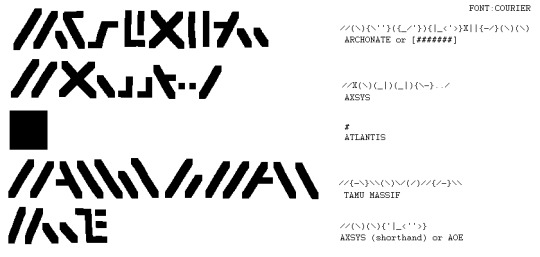
Excavating Atlantean script (expect a writeup one of these days)
6 notes
·
View notes
Text
Plates VI and VII from Charles Barbier's Essai sur Divers Procédés D'Expéditive Française (1815).
His student Louis Braille used plate VII to develop a more compact and flexible system, later known as Braille.
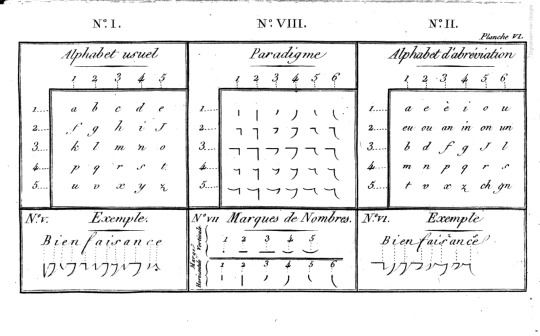
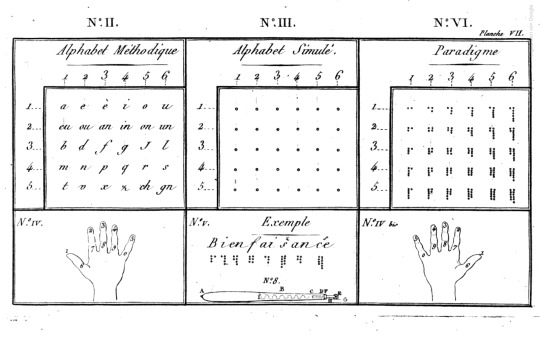
#nightwriting#braille#charles barbier#Essai sur Divers Procédés D'Expéditive Française#1815#1800s#louis braille#writing#writing system#language#linguistics#graphematics
2 notes
·
View notes
Photo
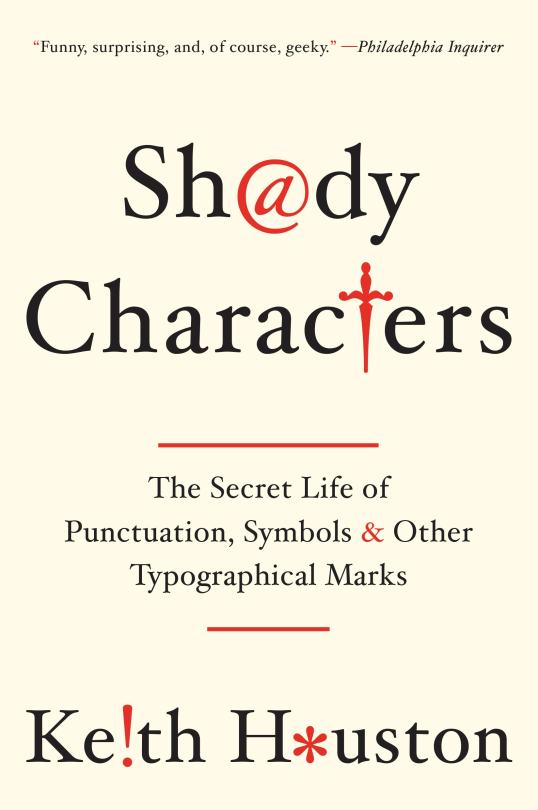
I’ve read “Shady Characters. The Secret Life of Punctuation, Symbols & Other Typographical Marks” by Keith Houston
This book was published in 2014. It cronicles the histories of several punctuation marks and other typographical characters of English. There are chapters on the pilcrow ¶, the interrobang ‽, the octothorpe #, the ampersand &, the @ symbol, the asterisk * and dagger †, the hyphen -, the dash –, the manicule ☛, quotation marks “” and typographic depictions of irony.
In many of the chapters you can read about the origins of additional typographic marks. So if you’re wondering (like I did) why Houston wouldn’t want to tell me about the comma, don’t worry. It’s in there. I especially enjoyed learning about the origins of the @ symbol and its associations with trading. I was not the biggest fan of the chapter on irony, especially irony on the *~internet~*, but oh well.
I found the book educational and entertaining. You learn a lot about stuff that is not technically typographical. But that is to be expected, since Houston wants to accurately set the scene for the contexts in which every mark was created and how it has developed ever since.
There are just the right amount of graphics in the book to depict certain marks in old manuscripts or variations of marks such as the ampersand.
I was especially fond of the colour work: While the whole text is (expectedly) set in a black font, all the “special” typographical marks (not stops or commas, though) are set in red:

[Depicted above is a photo of part of a book page. All the typographical marks such as asterisks, daggers etc. appear in red when they are part of the main text.]
The book ends with a small annotated further reading section and a vast notes section full of further further readings.
I recommend “Shady Characters” to all typography nerds and fans of historical graphematics and punctuation. From reading this, you will learn when to use which dash (what the heck, english?), a lot about the people working at the library of Alexandria and the consequences of limited space on typewriters.
I did some livetweeting while reading here (in German), if you’re interested in such things.
#linguistics#lingcomm#typography#shady characters#keith houston#punctuation#graphematics#etymology#12in21lingcomm
297 notes
·
View notes
Link
36 notes
·
View notes
Text
a few notes on translation
hey everyone, in light of some of my recent posts (here and here) making the rounds, I’d like to say a few things.
first, I want to say that I am not interested in trying to find a satisfactory english translation of zewu-jun at this time. I know everyone means well and is sharing different ideas out of excitement. that’s great!! I’m very glad I could get you all to consider the complexity of the title and all the pitfalls that come with trying to translate it! however, I do not wish to receive any more suggestions on how to translate zewu-jun. as I said, forcing one language into the shape of another is never going to work perfectly. that’s the nature of the thing.
I understand the impulse and temptation to try to find words in your own language to describe something that you care about, of course I do. but sometimes, you won’t be able to find those words--perhaps they elude you, or perhaps they don’t exist at all. there’s a discomfort in that, I know, but I hope everyone reading this can forgive me for saying that I want you all to live in that discomfort. after all, I have lived here my whole life. when I speak to my family, I do so knowing that I am constantly interacting with them through translation. that no matter how good my english is, it will fail me when it comes time to transmute my thoughts into chinese words.
not gonna lie, it sucks.
It occurred to me sometime in college, I think, that many people don’t experience this: the inherent alienation of not sharing a native language or culture with your parents. I was fiercely jealous, suddenly. I think about all the times my mother and I failed to communicate because of this barrier. I think about all the times that failure hurt. it all felt very unfair.
in a sort of roundabout way, I suppose my current refusal to provide, or even search for, a simple translation of zewu-jun is my attempt to force some of you to experience this, just a little. the feeling of not being able to capture your thoughts in words. the feeling of not being able to communicate. maybe that’s unkind of me, I don’t know.
every time I translate seriously, I think about how lawrence venuti described the violence of translation:
My use of the word “violence” here has been questioned by a professional translator ... Yet if by this term we mean “damage” or “abuse”, then my use of it is neither exaggerated nor metaphoric, but precisely descriptive: a translator is forced not only to eliminate aspects of the signifying chain that constitutes the foreign text, starting with its graphematic and acoustic features, but also to dismantle and disarrange that chain in accordance with the structural differences between languages, so that both the foreign text and its relations to other texts in the foreign culture never remain intact after the translation process.
Translation is the forcible replacement of the linguistic and cultural differences of the foreign text with a text that is intelligible to the translating-language reader. These differences can never be entirely removed, but they necessarily undergo a reduction and exclusion of possibilities - and an exorbitant gain of other possibilities specific to the translating language. ...
The aim of translation is to bring back a cultural other as the recognizable, the familiar, even the same; and this aim always risks a wholesale domestication of the foreign text, [oftentimes serving] as an appropriation of foreign cultures for agendas in the receiving situation, cultural, economic, political. Translation is not an untroubled communication of a foreign text, but an interpretation that is always limited by its address to specific audiences and by the cultural or institutional situations where the translated text is intended to circulate and function. [emphasis mine]
-- Lawrence Venuti, The Translator’s Invisibility, 2nd edition p.14 [line breaks added for readability]
it’s wordy, I know, but I think very important in a time when english is becoming/has become the world’s lingua franca, and brings with it its history of imperialism and colonialism. we have to acknowledge that the act of translation comes with violence, sometimes intentional, sometimes not. i don’t agree with venuti entirely--I think translation always damages, but does not always abuse. regardless, i have a very hard time taking this lightly, which is why I don’t do this for a job lol can you imagine.
i bring this up because it’s something that I want people to consider: that the very act of translation is violent. that the fact that we can experience this story at all is violent. that the constant search and demand for the “right” translation is, indeed, violent. that’s okay. it comes with the territory. i’m here too, and I’m glad to have met you. 💛 but I want us all to be able to acknowledge the fact that every time we talk about the source text in a different language, we are holding knives.
i obviously do not think that translation is bad, far from it. i think it’s wonderful and wondrous to be able to communicate across cultures and across time. i read mdzs in translation first, after all. I had to, much like most of you. without it, I would never have been able to experience this story that has become so important to me! translation, for all that it damages, also creates. it makes beautiful things. it is necessary. I love doing it, I love trying to find the right balance so that someone else can also fall in love with this thing I love.
whether or not you agree that translation is inherently violent is ultimately up to you: this is a philosophy, not a truth. I am not particularly well-versed in the discourse of translation. it’s possible that this is considered a truth in translation circles. as of writing this, I wouldn’t know. however, it is a philosophy that I subscribe to--it ensures that I keep my ego in check and reminds me that, like pretty much everything, translation is inevitably political and that it can have significant ramifications.
i want to end this by cycling back to the beginning of this post. all of the suggestions I’ve received are innocuous and well-meaning. I don’t want anyone to feel bad about sending them. i hope you don’t by the end of this post! like I said, I appreciate that they’re all coming from a place of enthusiasm and love. i promise you, I get it. but I won’t be responding to any others.
if you’ve gotten to this point, i urge you all to read @hunxi-guilai‘s notes on her translation process here. she and I have very similar approaches and concerns when we try our hand at mdzs/cql translations, even if we don’t come from or end up at the same place. Though we have a similar cultural background, we have very different wells of knowledge. she does things I can’t, and I do things she can’t. we prioritize differently. but in that post, you can see a practical application of what I’m trying to say here.
and finally, remember, like hunxi said in her disclaimer: we are human, subjective, and fallible. and, in this case, we are both american. do not take our word as law, do not assume that our heritage makes us experts, or gives us a pass. it’s vital to apply your own reasoning to our posts, including this one.
in summary, here is what I want to say: 1) translations will always fail, 2) translations are always violent, 3) the way many people in EN fandom continue to try and find “the perfect translation” for terms and names is part of that violence, 4) if you like the things I post and talk about, then I hope you’ll think about this too
thanks, everyone 💛
#translation#translation theory#mdzs#the untamed#mine#mymeta#cyan gets too deep in the weeds#long post#rip to me i guess#is this even coherent? idk#is there a thesis in this? kinda maybe#look i just think about translation a whole lot#and what translation can do#and the myriad of ways it can be used as a weapon#or a tool#mdzs meta#racism#fandom#cyan vs heritage
472 notes
·
View notes
Text
The question of strata can insinuate itself into every word of Trakl's text, because it is at the 'core' of any rigorous graphematics. Each stratum is a dimension of dispersion, flattened like a spiral galaxy. This flatness is just as crucial to the study of intensities as the trajectories traced within it, since the stratification or stacking of organizational levels is the basic form of any possible energetic surplus, the irreducible or final principle of 'real form': redundancy.
Each stratum has its specific 'negentropy' or positive range of compositions, 'selecting' only a relatively narrow series of combinations from the stock of elements generated by its substrate. A stratum thus inherits an aggregate 'degree of difference' or grammar, distinguishing it from a certain potentiality of 'randomness' (unproblematic reducibility into its substrate), and constituting a potential for teleological illusion (unproblematic reduction of its substrate).
This stratification of intensive positivities, which is most clearly indexed by the successive unities of letter, word, sentence, etc. that are precipitated out of a common 'graphic plasma' or semiotic substance within alphabetical regimes, is the only rigorous basis for an architectonics of the sign. Only because of such a graphic redundancy - for example, that stored in the difference between letter and word - between the words an alphabet makes possible and those which are realized - can energy be unevenly distributed within a stratum, and intensities generated.
Claude Shannon's theory of information understands redundancy as the dimension of a message that does not function at the level of communication, but rather functions as a resource for the discrimination of the incommunicative (,noise') from communication in general, thus providing a layer of insulation against the degradation of the message.
This formulation seems to me to lack two crucial elements:
1) It fails to provide any suggestion as to how the message participates in the constitution of redundancies (thus taking redundancy as a transcendental condition of communication). This first default leads to the preservation of the metaphysical distinction between semiotic and material processes (messages and techniques), which is otherwise profoundly shaken by the thought of redundancy; the thought, that is, of an isolation or 'de-naturalization' of the semiotic stratum proceeding by means of intensities or surpluses that invoke no element of negativity, but only gradations.
2) It fails to acknowledge the political dimension of redundancy as a means of trapping disruptive signals. It is this 'trapping' within an intermediate zone between strata that first enables the categories of madness perversion, deformity, disobedience, and indiscipline to be constituted, thus providing the basis for the associated but counterposed disciplinary programmes of pedagogy, psychiatry, punition, etc.
To fail to acknowledge such questions is to take the notion of noise as a purely passive and non-sentient interruption rather than as a strategically oriented 'jamming' of the message, and thus to ignore the conflictual aspects of both grammars and anti-grammatical subterfuges as they contend within the fluctuating space of redundancy or control. This default is typical of a technocratic scientificity which takes the question of power as having been always already resolved prior to the question of technique.
2 notes
·
View notes
Text
„Da werde ich mal was zu machen“
‚I will do something about that‘
vs
„Da werde ich mal was zumachen“
‚I will close it“
Series: x Sprache — schwere Sprache (x = German)
#lingblr#linguistics#graphematics#orthography#empty spaces matter#linguistic examples#german#langblr#linguist humor#xSprache schwere Sprache
9 notes
·
View notes
Photo

Topic day #214: Punctuation IV
13 notes
·
View notes
Text
When Graphematics meets Phonology: „asdfghjkl“
I am going to start using this word irl conversations. I want to see how people interpret it: 1. he is happy about something!, 2. he is having a stroke!?, 3. is he choking on his own tongue??
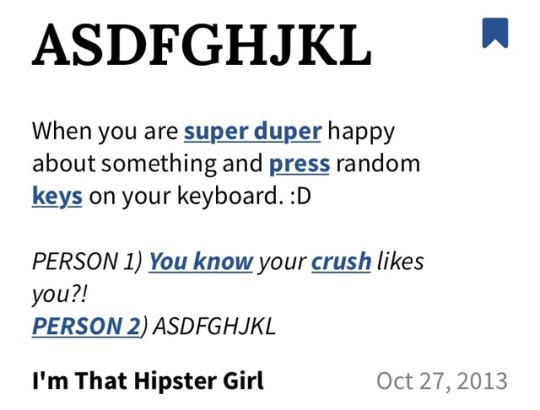
#linguistics#linguisthumor#graphematics too cute to be a science#phoneticsissexyphonologyislikethecigarreteafter#graphematics#phonetics#asdfghjkl#IM#internet language#IM language
36 notes
·
View notes
Text
James while John had had had had had had had had had had had a better effect on the teacher
Series: Graphematics — too cute to be a science
English sentence used to demonstrate lexical ambiguity and the necessity of punctuation. Source
#graphematics too cute to be a science#linguistics#linguisthumor#had had#punctuation#graphematics#orthography#ambiguity
9 notes
·
View notes
Note
I was wondering if there is any reason why so many alphabets start with A (or the respective equivalent of A) I tried to find answers in my own but I couldn't
Ohhh, that’s a lovely question!
Most alphabets that start with a have a common ancestor. So actually their entire sequence is similar, not only the first letter. Here’s two posts that might interest you
A video on the history of alphabets
An illustration and a link to more
48 notes
·
View notes
Video
youtube
Keaton Music Typewriter Demo: Basic demo of a rare 1953 music typewriter
18 notes
·
View notes
Link
379 notes
·
View notes
Link
96 notes
·
View notes
Text

Source
#linguistics#linguisthumor#lingblr#graphematics too cute to be a science#orthography#writing systems#linguistics meme
109 notes
·
View notes